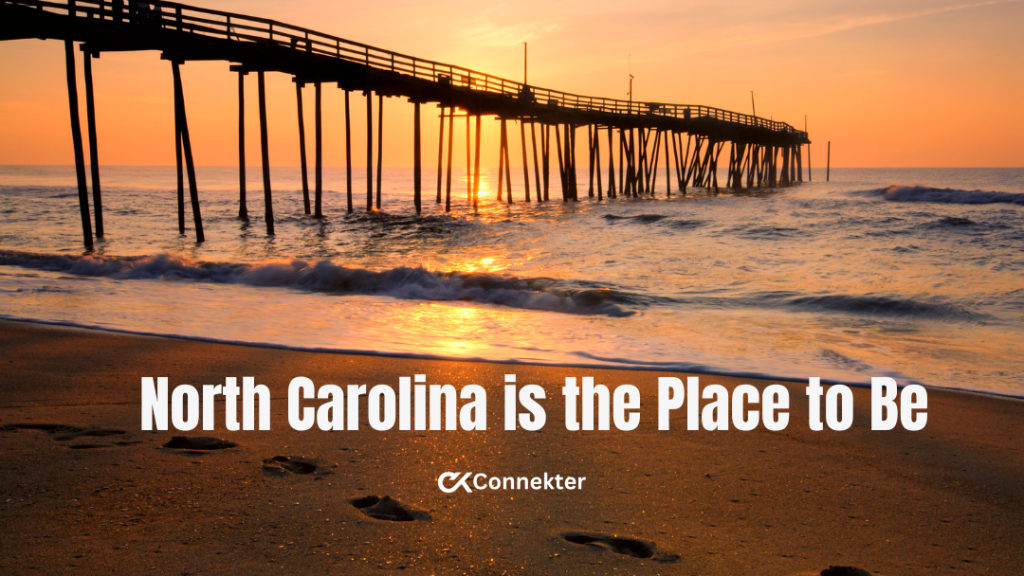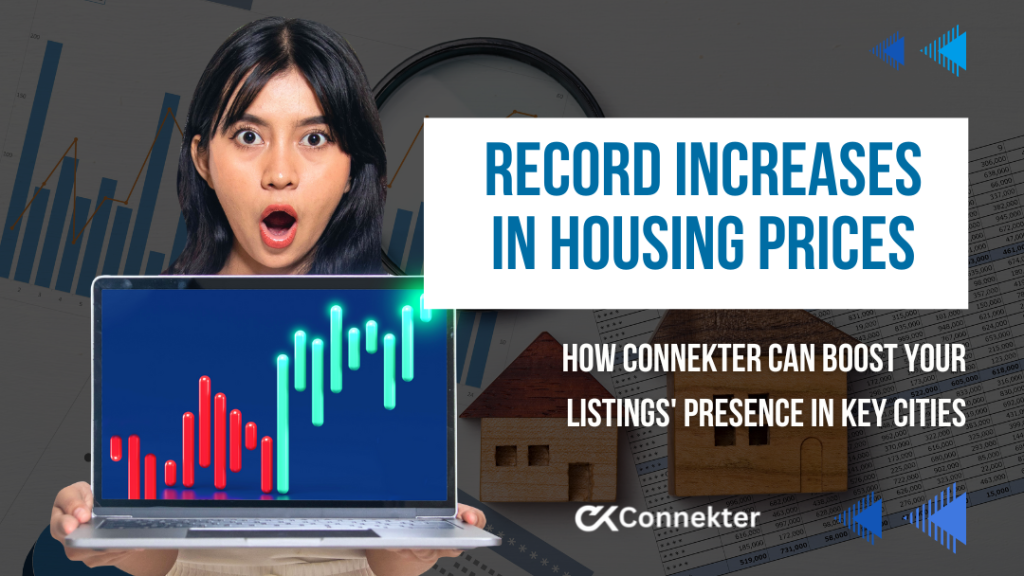
North Carolina Real Estate: Your Ultimate Guide to Buying, Selling, and Investing with Connekter
Welcome to North Carolina, where the the flowers bloom and temperatures rise, so does activity in the real estate market.
North Carolina is one of the most sought-after states in the Southeastern U.S. for real estate investments, offering diverse landscapes, thriving cities, and a growing economy. Whether you are considering purchasing a home, investing in commercial properties, or exploring rental opportunities, North Carolina presents a wide range of options.
This guide will walk you through the key characteristics of North Carolina’s real estate market, as well as current opportunities for buyers and investors—and how Connekter, your ultimate lead generation platform, can make the process easier and more rewarding.
Only three states (Texas, Florida, and California) surpassed North Carolina’s population growth between July 2023 and July 2024, adding 165,000 new permanent residents. Since the 2020 Census, North Carolina has added 605,000 people to reach over 11 million. By 2050 it is expected to have a population of 14 million. What key trends will shape real estate investing in North Carolina?
North Carolina’s Current Real Estate Market: What’s trending
What should real estate investors expect next year in the North Carolina housing market? Here’s a quick overview of the top North Carolina real estate market predictions for 2025:
- Strong job growth and in-migration will continue driving housing demand. Housing inventory, especially in Raleigh, is increasing, which should help moderate price increases. Prices in Charlotte will likely rise between 2.3% and 4.4% next year. Raleigh’s market will also see continued price increases, fueled by high demand relative to supply.
- New listings have risen, helping to create a more balanced market for 2025. Raleigh, particularly, is seeing a lot of new construction. However, inventory in areas like Wake County and Chapel Hill is still low, keeping the housing inventory tighter in those markets.
- New apartment units will stabilize or slightly increase rents. However, strong rental demand, mainly due to housing affordability issues, will prevent big rent drops. Raleigh’s rental rates will likely stabilize or see modest changes, while Charlotte’s rents may rebound moderately by mid-2025 as the market adjusts to increased supply.
How Connekter Can Help:
Our platform connects you with local agents, lenders, and experts who can help you navigate North Carolina’s fast-moving market. From finding the perfect home to generating leads for your next big investment, Connekter has you covered.
The Best Cities to Buy and Invest in North Carolina
Demand for housing remains high in major urban areas like Charlotte, Raleigh, and Durham, making them desirable areas for real estate investing in North Carolina. The strong job market in these cities, especially in growing fields like tech and healthcare, continues to attract people.
In 2025, the housing market in North Carolina will remain stable, mainly due to continued job growth and people moving to the state. Prices will continue to grow, but at a moderate pace, with some regional variations. Let’s take a closer look at the standout cities for buyers and investors:
Charlotte: The Largest City in North Carolina

Charlotte is a major financial hub and a hotspot for real estate. The city is home to major financial institutions, including Bank of America, and has seen rapid growth in the tech sector. The real estate market in Charlotte is vibrant, with rising demand for both single-family homes and apartments.
Average Home Prices: $350,000 to $450,000
Investment Opportunities: Multi-family residential properties, commercial spaces in the Uptown area, and luxury homes in neighborhoods like Myers Park and Ballantyne.
Raleigh: Education and Health

Raleigh is known for its excellent schools, universities (including NC State University), and a robust job market. As part of the Research Triangle area, it benefits from a combination of academic institutions, tech companies, and healthcare facilities. Raleigh offers a more suburban feel compared to Charlotte, with plenty of family-friendly neighborhoods.
Average Home Prices: $300,000 to $400,000
Investment Opportunities: College-town rental properties, single-family homes, and commercial real estate, particularly in the tech and healthcare sectors.
Durham: Innovation and History

Durham, also part of the Research Triangle, is known for its innovation, rich history, and revitalized downtown area. The city’s growth in the medical and tech industries makes it attractive to young professionals and families.
Average Home Prices: $275,000 to $375,000
Investment Opportunities: Properties near Duke University, residential developments in emerging neighborhoods, and commercial real estate in the city’s expanding tech districts.
Asheville: Mountain Destination

For those interested in mountain living, Asheville is a popular destination. Known for its vibrant arts scene, craft breweries, and outdoor recreational activities, Asheville has seen an influx of people moving from larger cities in search of a slower pace of life with all the modern amenities.
Average Home Prices: $350,000 to $500,000
Investment Opportunities: Vacation rental properties, luxury homes, and boutique inns or bed and breakfasts.
Connekter connects you with top-performing local agents who know these markets inside and out. Whether you’re buying, selling, or investing, our platform ensures you get the insights and support you need to succeed.
The Economic Drivers Behind North Carolina’s Real Estate Market
The housing market in North Carolina shows several positive trends that are attractive to real estate investors, like a strong job market, a growing population, robust housing demand, and increasing home values. As the data shows, the trends may differ slightly per city or county, so do your due diligence.
Diverse Geography:
North Carolina offers an exceptional mix of landscapes, from the Appalachian Mountains in the west to the coastal plains and beaches on the east. Buyers can choose from urban environments like Charlotte and Raleigh, or rural retreats in the mountains or along the coast. This diversity makes the state attractive to a variety of buyers, from first-time homeowners to luxury real estate investors.
Growing Economy:
The state’s economy is one of the fastest-growing in the U.S., with industries such as technology, finance, healthcare, and education driving the growth. Cities like Charlotte are often referred to as “The Next Big Tech Hub,” attracting tech professionals and creating demand for both residential and commercial properties.
Affordable Living:
Compared to states like California or New York, North Carolina offers more affordable housing options, which is one of the primary reasons for its growing popularity among families, retirees, and young professionals.
Real Estate Investment Opportunities
North Carolina is a growing market for real estate investors, especially in areas with rising demand for both residential and commercial properties. Here are some investment opportunities to consider:
Single-Family Homes:
North Carolina’s affordability and steady population growth make single-family homes a solid investment choice. Whether you’re looking for a long-term rental property or planning to flip homes, there are plenty of opportunities in both urban and suburban areas.
Multi-Family Properties:
With an influx of professionals, students, and retirees, multi-family properties in cities like Charlotte, Raleigh, and Durham are in high demand. This sector has shown consistent returns, especially in areas with growing job markets and universities.
Vacation Rentals:
The tourism industry in North Carolina is booming, especially along the coast and in mountain towns like Asheville. Investing in vacation rental properties can be profitable, particularly if you focus on locations near popular tourist attractions, beaches, or national parks.
Commercial Real Estate:
As North Carolina continues to expand its economic footprint, commercial properties, including office spaces, retail locations, and industrial properties, present significant opportunities. Cities like Charlotte and Raleigh are key markets for investors interested in office buildings, while retail spaces are thriving in areas with growing residential populations.
Navigating the North Carolina real estate market can be complex, especially for new buyers and investors. That’s where Connekter comes in, offering valuable tools and expertise to help individuals make informed decisions and maximize their opportunities. From first-time homebuyers to seasoned investors, Connekter provides the resources, data, and local connections needed to make confident, informed real estate decisions. Whether you’re looking for a new home in Raleigh, an investment property in Charlotte, or a vacation rental in the mountains, Connekter streamlines the process and ensures you don’t miss out on the best opportunities in North Carolina’s dynamic real estate market. Read more…
Real Estate Pricing and Market Trends
The real estate market in North Carolina has experienced consistent growth in recent years. However, home prices have continued to rise, especially in major metropolitan areas. The average home price across the state as of early 2025 is approximately $350,000, with suburban areas offering more affordable options compared to urban centers.
Trends to Watch:
- Urban Growth: Cities like Charlotte, Raleigh, and Durham continue to experience strong population growth, which is driving up demand for both residential and commercial properties.
- Suburban Expansion: Suburban areas around major cities are becoming increasingly popular due to lower prices, more space, and access to good schools. This trend is likely to continue, particularly in the wake of remote working trends.
- Luxury Real Estate: North Carolina is also becoming a destination for luxury real estate buyers, with high-end properties in neighborhoods like Myers Park in Charlotte and Biltmore Forest in Asheville seeing growing demand.

Why North Carolina is the Place to Be
North Carolina’s real estate market is full of opportunities for both new buyers and experienced investors. With a combination of affordable prices, a strong economy, and a variety of locations to choose from, the state is an ideal place to explore real estate investments. Whether you’re looking for a family home, an investment property, or a commercial opportunity, North Carolina offers a dynamic and rewarding market for all types of buyers.
And with Connekter, you don’t have to navigate it alone. Whether you’re looking to buy, sell, or invest, we’ll connect you with the right professionals, leads, and resources to make your real estate journey a success.
Extra Resources for Your North Carolina Real Estate Journey
To dive deeper into Michigan’s real estate market, check out these helpful resources:
- North Carolina Housing Market Predictions for 2025 & 2026. Read more…
- Spring 2025 Real Estate Investment Opportunities: Trends to Watch and Markets to Target. Read more…
- Housing Market Price Forecast for 2025 and 2026 Increased by NAR. Learn more…
- The 2025 Housing Market in the Carolinas: What Homebuyers Can Expect from New Construction – and How True Homes Can Help. Read here…
- Why Connekter is the Top Lead Generation Platform. Read more here…

